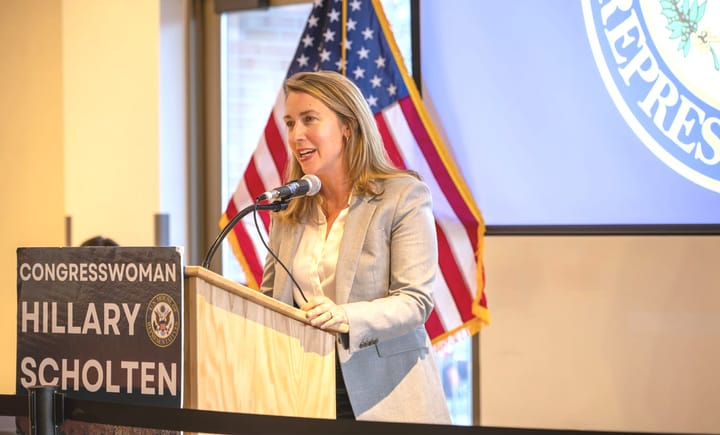County commissioners say they were misled, pressured to approve severance agreements
“What concerns me is that no substantial evidence has ever been presented to board members, the HR department, or our HR attorney to substantiate either Moss’s narrative or Epperson’s allegations."

OTTAWA COUNTY — The two factions on the Ottawa County Board of Commissioners battled through a contentious five-hour meeting Thursday that resulted in the reapproval of a pair of controversial severance agreements with Interim Administrator Ben Wetmore and Executive Aide Jordan Epperson.
Board chair Joe Moss publicly said the re-approvals were “out of an abundance of caution” after a lawsuit filed Dec. 16 challenged the legality of the agreements and how they were approved at the board’s Dec. 10 meeting.
Read More: Appeals court declines to halt severance payouts to Wetmore, Epperson
Behind the scenes, however, both men indicated they had legal claims against the county and that if they didn’t receive severances, they would pursue the county for bigger payouts.
“The severances in question are not being awarded based on merit; these individuals worked for the county for just over a year,” Commissioner Jacob Bonnema said Friday. “In my view, the primary reason for the inflated severance packages they are receiving stems from their connections with Chairman Joe Moss and Ottawa Impact."
Ottawa Impact is a far-right fundamentalist group formed in 2021 over frustrations with the county and state over COVID-19 mitigation measures.
“Moss informed the board that an investigation had been conducted regarding Epperson’s claims against the county, and it appears this has led us to our current situation,” Bonnema said.
Internal concerns raised by the county’s human resources staff also indicate that Wetmore may have violated his agreement with the county by continuing to work on the hiring process of a new human resources director, necessitating that his severance agreement not only be reapproved but amended.
How we got here
At the Dec. 10 board meeting, commissioners went into separate closed sessions “at the request” of aide Jordan Epperson and Wetmore, respectively. After emerging from each closed session, the board approved separation agreements for both men in separate split votes.

The reason to go into closed session was listed for both men as: “To consider the dismissal, suspension, or disciplining of, or to hear complaints or charges brought against, or to consider a periodic personnel evaluation of, a public officer, employee, staff member, or individual agent, if the named individual requests a closed hearing.”
That’s legally problematic, according to Grand Rapids-based attorney Sarah Riley-Howard, who filed for a temporary restraining order Dec. 16 that would have prevented the separation agreements with Epperson and Wetmore, which exceed $280,000.
Documents released by the county on Dec. 16 through a Freedom of Information Act request confirmed that Wetmore will receive one year of pay, which is $175,000, which is subject to taxes and withholdings; he will not receive health insurance beyond his separation date of Jan. 1, 2024.
Read More: County confirms $280,000 in payouts to interim administrator, aide
Epperson will receive five months of pay ($33,974.20) as well as five months of insurance benefits. He also will receive a lump-sum payment of $75,000, which is not subject to tax and withholdings. Not including the cost of benefits, Epperson will receive $108,974.20; his employment also will end Jan. 1.
Howard claims the county board violated Michigan’s Open Meetings Act in multiple ways. First, by not going into a closed session for a legally valid reason — the county wasn’t actively seeking their dismissal, nor had complaints or charges been raised, nor were evaluations requested.

Both employees allegedly told commissioners they would pursue legal action against the county if they didn’t receive agreements, multiple sources with firsthand knowledge of the matter previously told the Ottawa News Network.
Howard said Moss “intended to champion the county” by offering Epperson and Wetmore “lucrative severance agreements in closed session.”
Secondly, the resolutions to approve the separation agreements didn’t disclose any details of the agreements and might not be clear enough to be legally binding — another potential violation of OMA, Howard said.
“In failing to disclose any details about the agreements with Epperson and Wetmore, (the county) also violated OMA’s requirement that all decisions of a public body take place in a public meeting,” Howard said in the filing.
On Dec. 18, Kent County 17th Circuit Court Scott A. Noto denied Howard’s request for an emergency restraining order, which also included a legal challenge to the validity of a contract for $563,000 the county approved (also Dec. 10) to pay Chester Township to perform remediation on Crockery Lake; she cited Open Meetings Act violations with that contract as well.
Howard filed an appeal with the Michigan Court of Appeals that same day, which was denied just hours before the board was set to meet at 9 a.m. Thursday, Dec. 19. Howard said she plans to appeal the decision.
“We are likely going to seek further appellate review on at least some of the issues we raised, even though an injunction is no longer an option,” Howard said Friday. “The meeting yesterday was a gross display of giveaways to OI’s political allies and just further confirmed the extent of the Open Meetings Act violations and disregard for transparency.”
What’s happening now
At the Dec. 19 meeting, Moss presented a re-approval of the severance agreements as “out of an abundance of caution” and denied that there were any legal flaws to the initial approvals on Dec. 10.
On Dec. 19, Moss said the closed sessions on Dec. 10 were to discuss the “dismissal” of each man, but that was disputed by non-OI commissioners.
“In closed session, we discussed Mr. Epperson's desire to leave. We did not discuss his dismissal,” Commissioner Doug Zylstra said.
“I didn't come up with it. It was a request. We had discussions in closed session. Then we exited closed session and voted 9-2,” Moss said. “That decision was challenged by Sarah Howard and out of an abundance of caution, we are revoting today. The decision is still valid because it was a board action.”
Bonnema disputed that account of events.
“The recommendation to pay this money out is based on things you said in closed session, so I think we need to discuss why that is,” he said Dec. 19.
Bonnema issued a statement Dec. 20 clarifying what he was inferring during Thursday’s meeting, saying Moss claimed that Epperson had legal claims against the county over an alleged investigation into the county’s human resources department.

“What concerns me is that no substantial evidence has ever been presented to board members, the HR department, or our HR attorney to substantiate either Moss’s narrative or Epperson’s allegations,” Bonnema said Friday. “Throughout the negotiations for Epperson's severance, Moss repeatedly invoked Attorney Nate Wolf's name in order to establish credibility. Additionally, Moss and other Ottawa Impact commissioners actively lobbied non-Ottawa Impact commissioners for increasingly extravagant severance figures, arguing that the evidence was so compelling that Epperson could secure millions in court against us. At the time, I openly criticized this absurdity to the board.”
Bonnema said he was frustrated that Moss and corporation counsel said at the Dec. 19 meeting there was no feasible way for the board to consult with Wolf to confirm the facts presented to the board in closed session on Dec. 10.
“Moss's refusal to grant board members access to our HR attorney and HR director regarding this matter raises serious ethical concerns,” Bonnema said. “He is likely aware that they would expose the truth behind his assertions. Just yesterday, Moss obstructed our ability to fulfill our fiduciary duty to the taxpayers. Citizens should consider the motivations behind Moss’s actions towards Ottawa County and demand accountability.”
Commissioner Christian Kleinjans confirmed Bonnema’s account of events Friday evening.
“What Commissioner Bonnema is saying is true, as I remember it,” he said. “We were also presented with a document to review, which contained essentially what we were told — that an HR investigation had been conducted, and the county faced exposure from litigation.”
Kleinjans said he felt the minority members on the board were pressured to vote with the OI majority to “show consensus” — otherwise, the OI majority would force through higher payout numbers because they had enough votes to do so.
“What we were discussing was an offer to attempt to stave off a possible lawsuit. The original amounts were high, very high,” Kleinjans said. “Again, we were told this was the low amount as recommended by HR legal. As the discussion evolved and the amount the board would offer was reduced, it was indicated that unless at least one non-OI affiliated member of the board voted for this agreement, to show there was consensus, the majority would just vote for and approve the original amount.”
At Thursday’s meeting, Bonnema repeatedly asked for the board to have access to Wolf, a Grand Rapids-based attorney, to verify the fact that an investigation into the county’s HR department had taken place.
“It has recently come to my attention that Attorney Nate Wolf never conducted a thorough investigation into Epperson’s claims against the county,” Bonnema said Friday. “The taxpayer funds disbursed to these two individuals seem to be based solely on a fabricated account presented by Joe Moss. I have always opposed inaction in the face of wrongdoing, and I believe this situation warrants a thorough investigation.”
Commissioner Roger Bergman also confirmed Bonnema’s and Kleinjans’ accounts of events.
“By insinuating that if we didn't pay what they wanted we would be sued for vast amounts of money, they were able to provide our ‘temporary’ administrator and his aide large payments — far beyond what they should have been paid,” Bergman said. “Some of us never saw what those allegations really were and whether or not they were really valid.”
Also of note, the board approved a payout to Epperson before re-enacting the decision that approved his agreement with the county, followed by an order to the elected county treasurer to issue a check while the meeting was ongoing.
Ottawa News Network has sent Moss a request for comment.
Internal concerns raised
As the board argued over whether or not to reapprove the initial agreements, an internal email was sent from Interim HR Director Zac VanOsdol to commissioners raising concerns that Wetmore had continued access to confidential information after the original severance agreement with him was signed.
Wetmore signed the original agreement on Dec. 10, which stated that the date the employee signed the document, the employee would turn over all access to county confidential information.
“On Tuesday, Dec. 17, Ben (Wetmore) requested HR provide an update on the background check process for Mr. Hawkes. Per the (board of commissioners) approved ‘Severance and Separation Agreement’ for Ben, HR was unable to provide Ben with an update on the process because that is confidential information and violates Ben’s agreement,” VanOsdol said in an email timestamped 11:07 a.m. Thursday, Dec. 19.
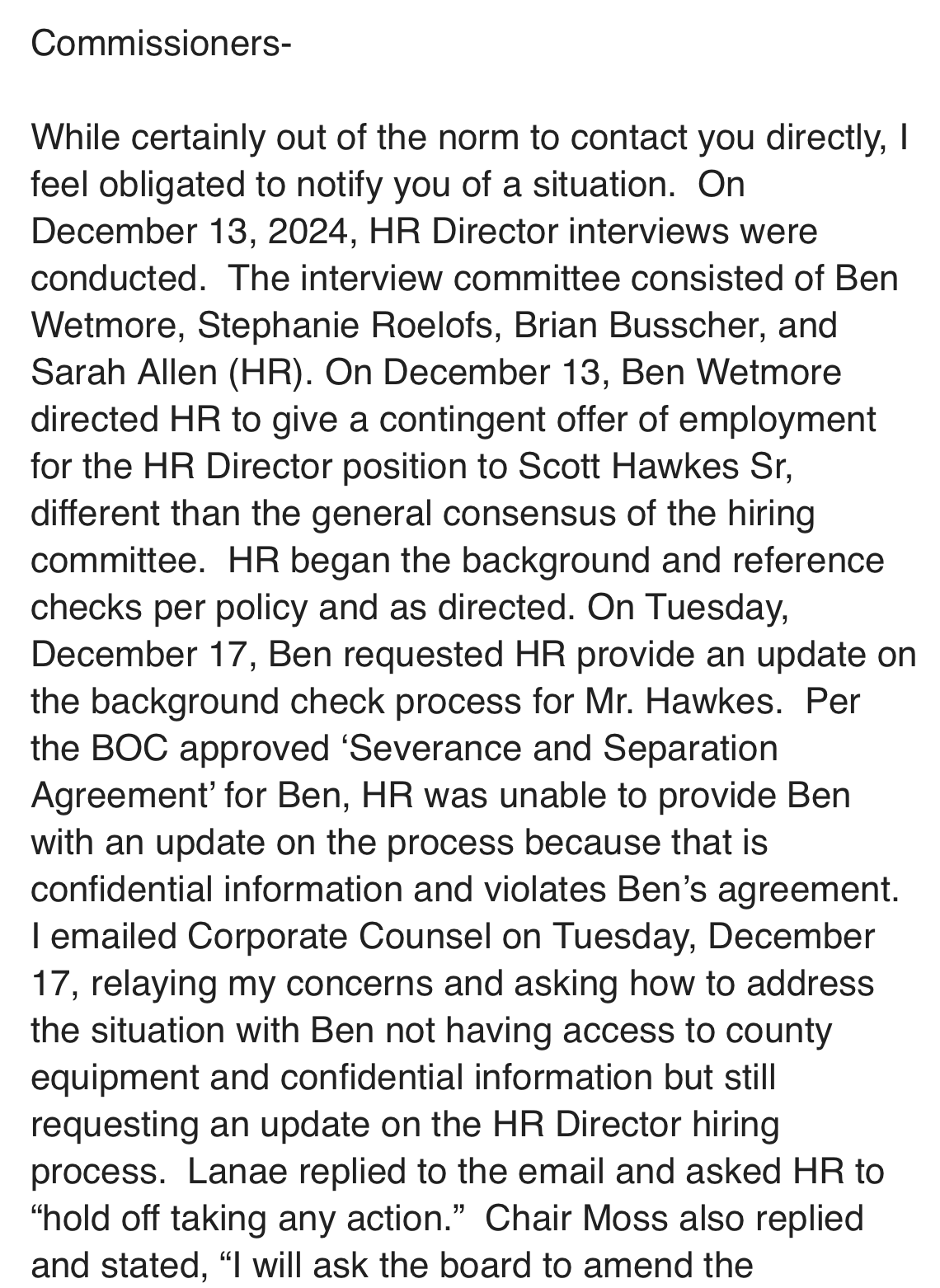
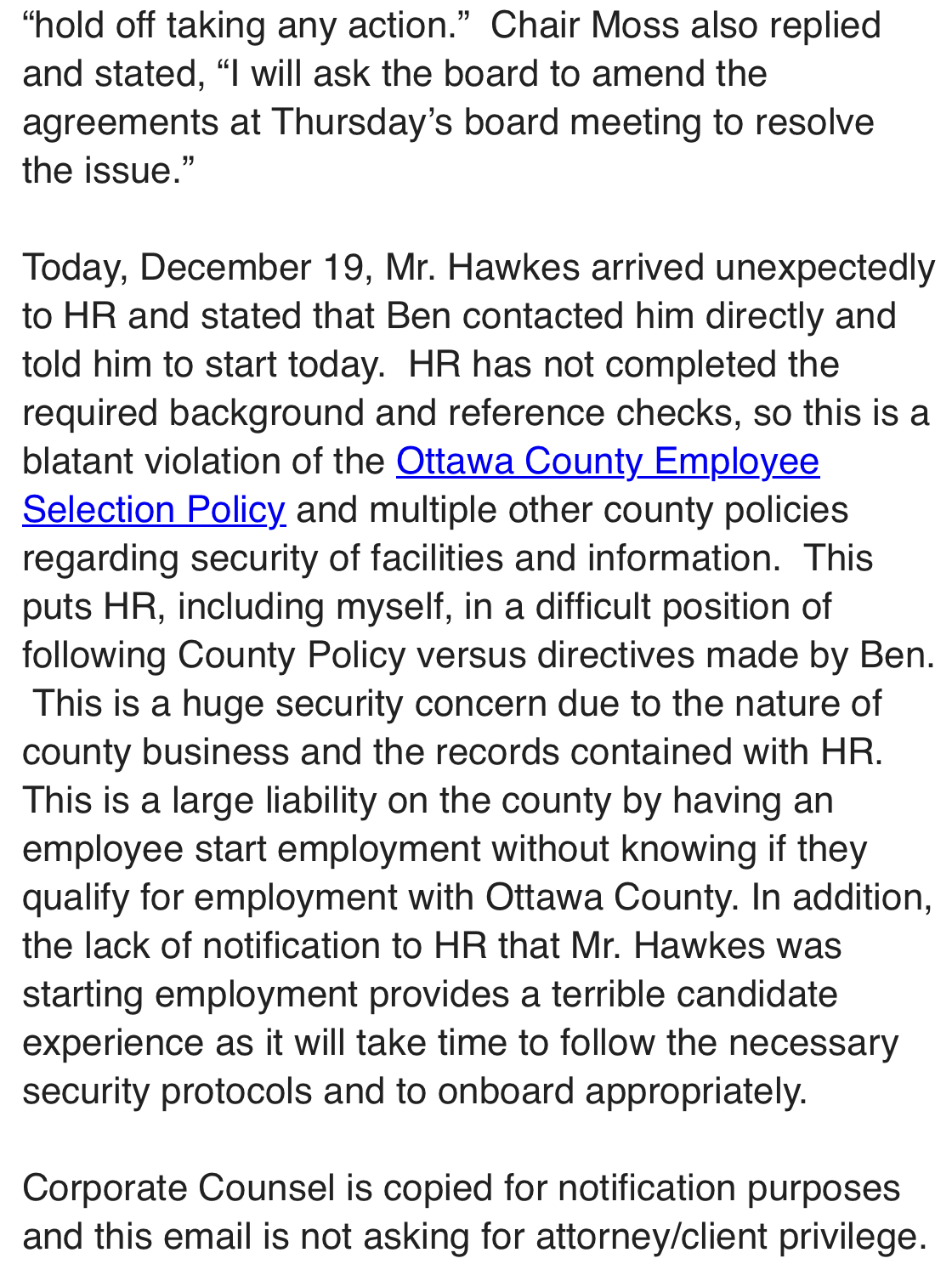
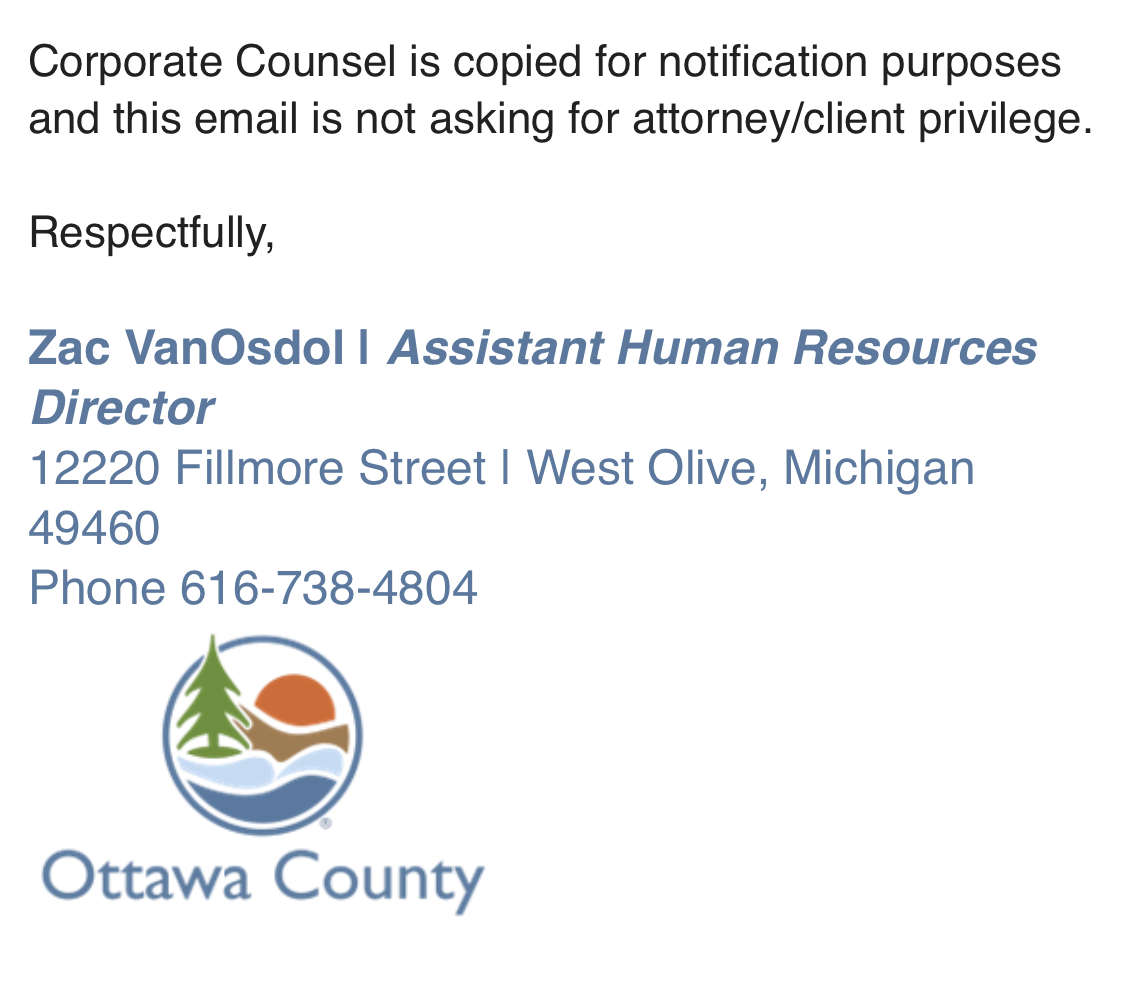
Ottawa News Network is not naming the source of the email because they fear retaliation from the OI majority on the board.
VanOsdol goes on to say he raised the issue with corporation counsel, which subsequently told him to “hold off taking any action.”
“Chair Moss also replied and stated, ‘I will ask the board to amend the agreements at Thursday’s board meeting to resolve the issue,’” according to the email.
VanOsdol goes on in the email to say Wetmore contacted the new county HR director, Scott Hawkes, directly and told him to report to work on Thursday, Dec. 19, even though the required background and reference checks through the county’s systems had not yet been completed.
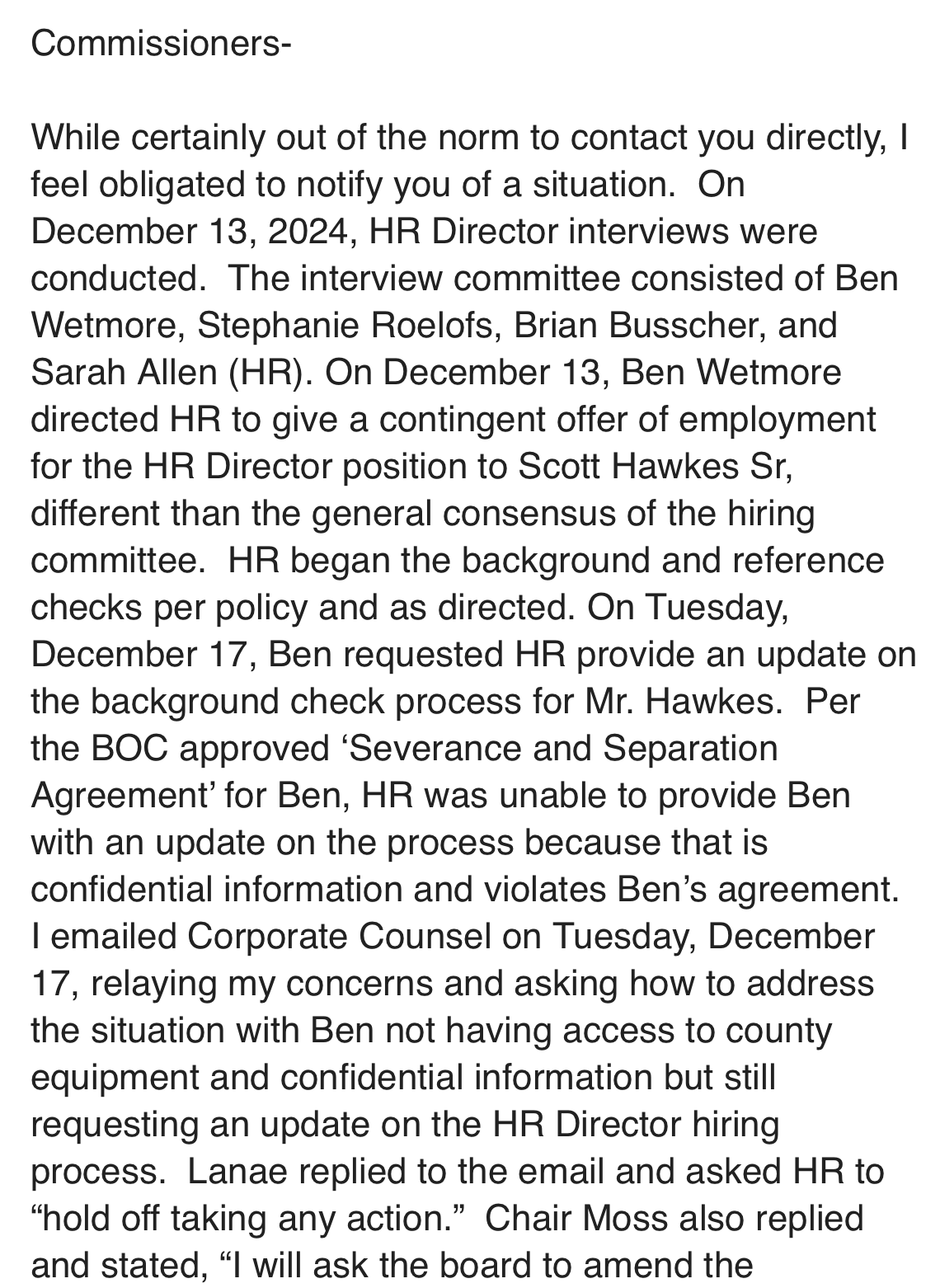
“This is a blatant violation of the Ottawa County Employee Selection Policy and multiple other county policies regarding security of facilities and information,” VanOsdol wrote in the email. “This puts HR, including myself, in a difficult position of following county policy versus directives made by Ben. This is a huge security concern due to the nature of county business and the records contained with HR. This is a large liability on the county by having an employee start employment without knowing if they qualify for employment with Ottawa County.”
Support Our Work
Ottawa News Network is a nonprofit news service dedicated to providing the residents of Ottawa County with trustworthy, community-driven news. ONN treats journalism as a public good — something that enriches lives and empowers Ottawa County’s 300,000-plus residents to stay engaged, make informed decisions, and strengthen local democracy. Please consider giving today.
Near the end of the Dec. 19 meeting, Zyltra asked Wetmore if he could confirm if an HR director had in fact been hired.
“We need to complete the onboarding process. Hopefully, we can make an announcement real quick,” Wetmore replied.
When Bonnema questioned how the hiring process was made for the HR director, Moss implied that if Wetmore answered, it would be disclosing confidential information.
— Contact Sarah Leach at sleach@ottawanewsnetwork.com. Follow her on Twitter @SentinelLeach.


